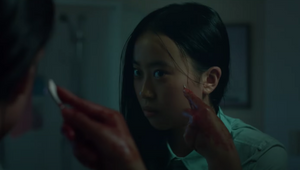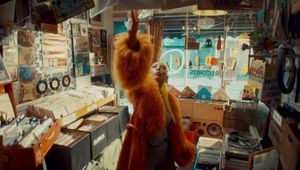
LBB Film Club: Merci

‘Merci’, the short film by directing duo Sang Froid, in collaboration with rap artist Wallace Cleaver offers a compelling cinematic interpretation of Wallace’s newest album – the result of the directors’ and the artist’s “almost inevitable” connection. The directing duo has now been nominated for UKMVA’s ‘Best New Director’, ‘Best Hip Hop/Grime/Rap Video’, ‘Best Cinematography in a Video’ and ‘Best Colour Grading in a Video’. Sang Froid spent a month fully immersed in each song of the album, which, at the time, they received an early version of. They took into account lyrics, key words and the emotions the music provoked, mixed with their own personal experiences. Through listening, the theme of family emerged, and quickly became central to the shape of the film.
First screened to a 600-strong emotionally charged Parisian audience, ‘Merci’ unpacks complex familial relationships, the innate nostalgia of childhood, and the cyclical nature of trauma. It follows the journey of Ezio, a sensitive 12-year-old navigating the trials of adolescence amidst the loss of his grandfather. Through lyrical storytelling, symbolic visuals and an evocative score, ‘Merci’ transcends the boundaries of both mediums, offering an immersive, multidimensional experience. As Sang Froid emphasise, their collaboration with Wallace Cleaver marks a growing trend in the music world, where artists are increasingly keen to explore visual storytelling and amplify the emotional depth of their work.
With ‘Merci’, Sang Froid delve into universal themes of healing and identity, bringing to life Cleaver’s universe while resonating with the complexities of human condition. Here is what they had to say about the process behind creating ‘Merci’.
LBB> How was this project born? Did you know Wallace before you started working on the project?
Sang Froid> This project is the result of a powerful, almost inevitable connection. Wallace Cleaver and his manager, Lewis Buzy, contacted us after discovering our work. We didn’t know them beforehand, but a mutual connection quickly developed. They proposed making a short film around the album, and we were immediately drawn to the idea of adding a visual dimension to his music.
For us, fiction is a deep, almost instinctive drive. It’s what has always fueled us. From our first conversations, it was clear that we shared a common vision: to tell a story that is authentic, intimate, yet universal. What struck us about Wallace was the raw sincerity of his writing, the way he blends rap and spoken word to express his struggles and hopes. This project was an opportunity to bring these themes to life visually, while staying true to the essence of his work.
We instantly felt a creative connection that made the collaboration feel natural. It was as if the project already existed somewhere, and we just needed to bring it to life.
LBB> Tell me a little about Wallace's album and the process you went through to create the film around it. What did the songs on the album provoke in you creatively?
Sang Froid> The creative process really began a few days after our first conversation with Wallace. We received an early version of the album, with about three quarters of the tracks still in the mixing phase. We took a month to immerse ourselves in each song, listening closely to the lyrics and gathering key words that stood out. This is how the theme of family, which we saw as central to the album, began to take shape.
The story gradually developed, inspired by the songs but also by our own personal experiences. This blend gave rise to a narrative that reflected both the emotions in the album and our own influences.

We had some short film ideas before starting this project, and some of them naturally fit into this story because they aligned so well. We wrote a twenty-page script, with dialogues just like a traditional film, even though these dialogues aren’t always audible in the final product.
Then we selected five tracks out of the eleven on the album to shape the narrative structure of our film, though every song helped to weave the overall story. Initially, the script was longer and had more characters. However, we had to make cuts to keep the film from becoming almost feature-length.
Overall, the album deeply moved us. It carried a sincerity and emotional intensity that resonated perfectly with the central theme, instantly drawing us into the story
we aspired to create. In the end, it felt almost natural to create a film that aligned with Wallace’s universe and his songs.

LBB> Tell me more about the benefits of bundling the album release with the short film. Do you think we'll see more artists doing collaborations like this and what does this add to the creative value of an album?
Sang Froid> Releasing an album alongside a short film amplifies the creative and emotional impact of the music. Visually, it gives the album a new dimension, where the songs are no longer just tracks to listen to but become chapters of a larger story. It's a way to enrich the sensory experience for the audience, offering them full immersion into the artist's universe.
This approach is a form of collaboration that merges different art forms, and yes, we believe we'll see more artists taking this path. Audiences today are looking for multidimensional experiences, and music alone sometimes isn't enough to fully capture the richness of what an artist wants to convey. Visuals complement the music, bringing atmosphere and a visual interpretation of the emotions in the album.
It's beneficial because it allows the listener to experience the album in a more immersive way and to better understand the artist’s vision. It becomes a complete work.
LBB> Tell me about the evolution of the characters. Each of them plays an important role in the passage of time throughout the film, what did you want to convey through them?
Sang Froid> Ezio is the emotional heart of our story. As a sensitive and intelligent 12-year-old boy, his journey revolves around the search for connection and understanding within his family. Throughout the film, Ezio navigates his conflicting feelings for his older brother and his father. At first, he idolises his brother, despite the negative influences he exerts on him. However, as the story progresses, Ezio learns to face the challenges within his family and ultimately discovers his own voice. His relationship with the wounded bird symbolises his desire for freedom and healing, reflecting his inner turmoil and growth.
Ezio's older brother represents both admiration and caution. Charismatic yet impulsive, he initially embodies the type of freedom that Ezio seeks. As the story unfolds, we see the consequences of his reckless behaviour, not only on himself but also on Ezio and their family. His evolution, shifting from a role model, to someone confronting the repercussions of his choices, underscores the themes of responsibility and the impact that decisions can have on loved ones.

Renaud, the father, adds depth to the narrative with his emotionally distant nature. His journey reflects the struggles he faces between his desire to protect his family and his inability to express his emotions. Throughout the film, he is confronted with his own limitations and begins to realise the consequences of his behaviour on his family relationships.
Emma, the older brother's girlfriend, represents youth and innocence. Her evolution, transitioning from a carefree young woman to a mother facing parental responsibilities, illustrates the challenges of premature maturity. Through her character, we aim to show how immature decisions can have repercussions on their lives and that of their child.
Overall, through the evolution of these characters, we wanted to convey messages about the complexity of family relationships, the search for identity, and the consequences of our choices. Each of them illustrates a facet of the human condition, allowing us to explore universal themes such as love, solitude, and responsibility within a difficult environment.
LBB> Where is the story based and why did you choose this location? How did location scouting go in pre-production?
Sang Froid> The story could have taken place in many rural areas of France. Initially, we envisioned it in the south of France, as the heat was meant to play a crucial role in the film. However, we ultimately opted for Normandy due to the ease of production it offered. This choice also allowed us to adapt certain parts of the script to a more maritime setting. For example, instead of making the father a butcher, we decided that he would work in a fish processing plant, which added an additional dimension to the story while fitting into our new environment.

During pre-production, location scouting was conducted collaboratively. We explored various sites in Normandy, searching for settings that resonated with the themes of the film. It was important for us to meet the owners of the locations and the locals to immerse ourselves in the region and ensure the authenticity of our story. We met wonderful people who, in their own small way, brought credibility to the film. The visual aspect and atmosphere of the locations were crucial, as they needed to enhance the emotion we wanted to convey through the story. We also considered the logistical needs for shooting, ensuring that the chosen places were accessible for the crew and actors. Ultimately, the choice of Normandy enriched the film, bringing a natural beauty that perfectly aligned with the narrative.
LBB> The film masterfully depicts the passing of time and nostalgia. There is a very gradual disintegration of childhood and its innocence – how did you achieve this?
Sang Froid> Childhood is at the heart of the story, and we wanted to capture its innocence while also showing the challenges of growing up.
To emphasise this transition, we used precise visual choices. The colours shift from bright hues, symbolising innocence, to darker palettes reflecting the struggles of adulthood. Familiar objects and settings evoke nostalgic memories, while flash forwards show Ezio reminiscing about happy moments, contrasting with the melancholy of the present.
The interactions between the characters also reinforce this feeling. For example, the relationship between Ezio and his brother evolves. The music, meanwhile, guides the viewer's emotions, creating an atmosphere that blends joy and sadness. In summary, we aimed to make these transitions palpable for the audience so that they could feel the beauty and loss of innocence throughout the film.

LBB> Tell me about the bird and the symbolism behind it, as well as its eventual release.
Sang Froid> The bird plays a central role in Ezio's evolution, representing both his vulnerability and his quest for freedom. The encounter with this injured bird, just after the burial of his grandfather, establishes a deep emotional connection. This animal becomes
a mirror of his own suffering and solitude, and their relationship offers him an escape from the sadness that engulfs him.
The discovery of this bird is not just about comfort; it also serves as an invitation to explore the cycle of life. The falcon, as a symbol of strength and emancipation, embodies the idea that even in moments of pain, there is a possibility for renewal. By caring for this bird, Ezio discovers the resilience and courage needed to face his own challenges.
The final release of the bird is a key moment in his growth journey. By letting it go, Ezio frees himself from his grief and fears, choosing to confront reality rather than remain trapped in his bubble of sadness. This gesture symbolises an essential step toward his emancipation, allowing him to transition from childhood to adulthood, where he learns that pain and loss are part of life, but they can also lead to freedom and healing.

LBB> The family seems to play a cyclical role in the storyline, with the grandfather dying at the beginning, new life arriving in the middle of the film, and the father changing his relationship with his youngest son at the end. Why was it important to portray these inner family relationships, and how did you manage to keep them dynamic, while showing us the effects of grief?
Sang Froid> Family indeed plays a cyclical and central role in our narrative, and it was crucial to depict these familial relationships to illustrate the process of grief and its consequences.
The character of Ezio, in particular, represents a break in this familial chain. His sensitivity and desire for reconciliation offer a glimmer of hope in a context often filled with pain and tension. The death of the grandfather at the beginning of the film acts as a starting point that impacts every family member. The interactions between Ezio and the other characters reveal the different ways each person copes with loss. For instance, when Ezio tries to connect with his father, it highlights the emotional distance that exists, but also the possibility of reestablishing a bond.


Ultimately, Ezio becomes an agent of change, seeking to break the cycle of pain and promote reconciliation. His sensitivity allows him to touch
those around him, demonstrating that even within suffering, it is possible to find pathways to healing and understanding. This underscores that familial relationships, although marked by grief, can evolve and transform through compassion.
LBB> What do you hope people walk away with after watching ‘Merci’?
Sang Froid> We hope that the film will touch the audience in one way or another. For us, cinema is a powerful medium for conveying emotions, and we wish for this film to inspire reflection on resilience.















